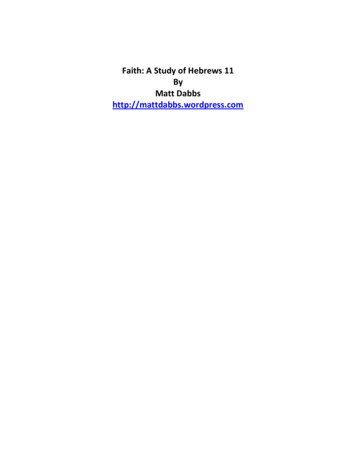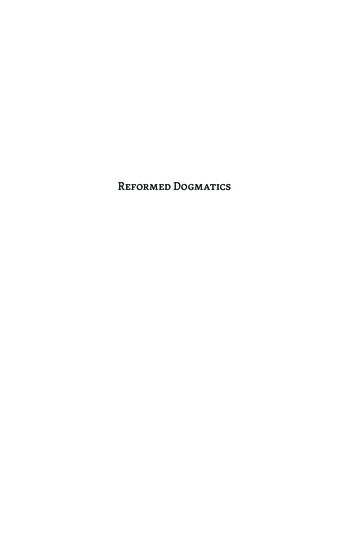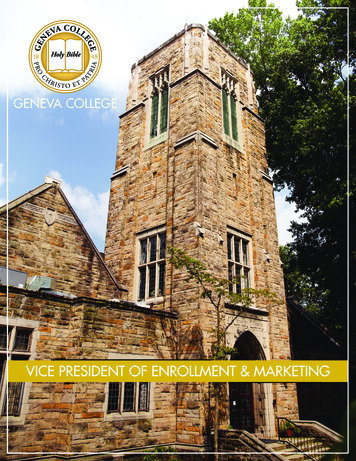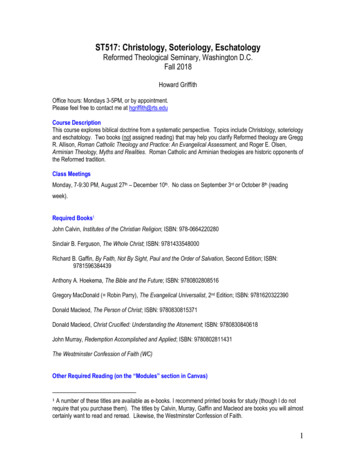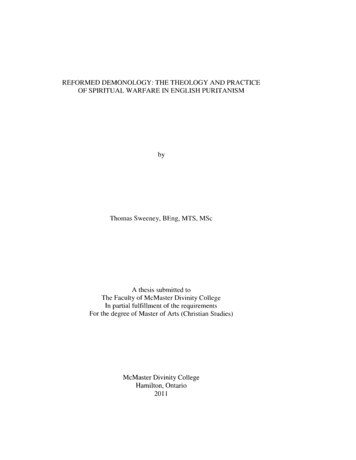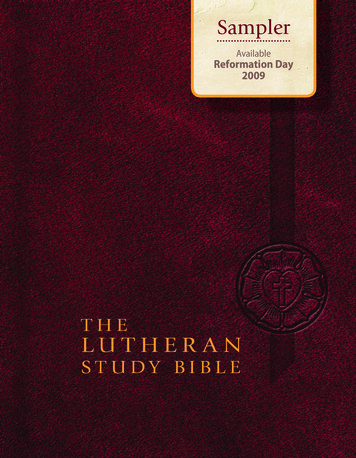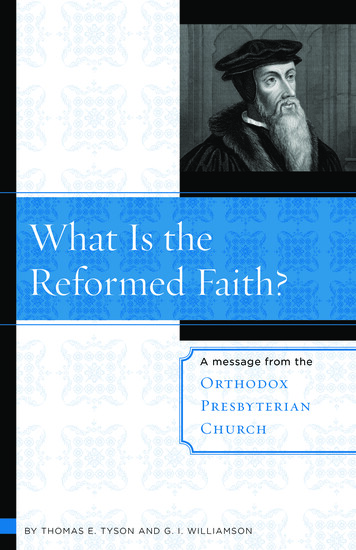
Transcription
What Is theReformed Faith?A message from theOrthodoxPresbyterianChurchBY T H O MAS E. T YSON A ND G. I . WI LLI A MSON
What Is theReformed Faith?High Points of CalvinismThomas E. TysonandG. I. Williamson
Published by:The Committee on Christian Educationof the Orthodox Presbyterian Church607 N. Easton Road, Bldg. EWillow Grove, PA 19090-2539First edition, 1996New edition, 2007Digital edition, 2012Scripture taken from the HOLY BIBLE,NEW INTERNATIONAL VERSION.Copyright 1973, 1978, 1984 International Bible Society.Used by permission of Zondervan Bible Publishers.The picture of John Calvin on the cover was provided byReformation Art (reformationart.com), a source of finephotographic prints of Protestant and especially Reformed interest.To order printed copies of this booklet,contact CCEsec@opc.orgor call 215/830-0900 (you will be invoiced);or order online (and pay by credit card)at www.opc.org/publications.html.
ContentsIntroduction.5.1. Relation to What Is the OPC?.5.2. The Reformed Faith as the Most Consistent Form ofChristianity. 6Part I: Reformed Principles.71. Bible-Based.7a. Sufficiencyb. Necessityc. Inerrancyd. Clarity2. God-Centered. 9a. His Gloryb. His Triune Salvation(1) Total Depravity(2) Unconditional Election(3) Limited Atonement(4) Irresistible Grace(5) Perseverance of the Saints3. Covenantally Ordered. 17a. The Covenantsb. Covenant and the Churchc. Infant Baptismd. All of Life RedeemedPart II: Reformed Practice.221. The Law of God.222. Principles of Conduct.23a. Labor and the Sabbath Ordinance—the FourthCommandmentb. The Sanctity of Life—the Sixth Commandmentc. Marriage—the Seventh Commandment3. Evangelism.25
Part III: Reformed Church Government.261. The Corporate Nature of the Church.262. The Government of the Church.273. The Discipline of the Church. 284. The Ecumenical Calling of the Church. 28Part IV: Reformed Worship. 301. Private and Family Worship. 302. Corporate Worship. 30a. Regulationb. Singing of Praisec. Preaching of the Wordd. The Lord’s Suppere. SimplicityConclusion.351. A Faithful Reformed Church.352. The Doxologies of Revelation 4 and 5.354
Introduction1. Relation to What Is the OPC?The companion booklet What Is the OPC? provides basic informationabout the Orthodox Presbyterian Church, including its history, doctrine,and ministries. The descriptive adjective “Reformed” occurs throughoutthat booklet, but is not fully defined. Basically, when we speak of theReformed faith, we refer to the true Christian religion as it was recoveredduring the Protestant Reformation of the sixteenth and seventeenthcenturies, under the leadership of John Calvin (1509–1564).In this booklet, we have selected those doctrines and that methodologywhich position the OPC as a Reformed church. Consequently, the reader willnot find here a treatment of those cardinal articles of the Christian religionthat Reformed churches hold in common with other churches, such as theTrinity, the atonement, justification by faith, the virgin birth and bodilyresurrection of Jesus, his miracles, and the inspiration of Holy Scripture.The Reformed faith holds to all the apostolic doctrines set forth in the Bibleand given credal formulation by the great ecumenical councils of the ancientchurch.It is important to recognize that these doctrines have been variouslymisinterpreted by the several branches of the visible church. Whichinterpretations belong to the Reformed faith, and which do not? The answerto that question can only be gained through a careful study of the Reformedcreeds, confessions, and catechisms—many quotations from which will beencountered throughout this study.Any adequate definition of the Reformed faith must focus on doctrine.Nonetheless, merely “buying into” some abstract body of truth does notqualify an individual or a church as “Reformed.” Rather, the Reformedfaith is a relationship to God, through Jesus Christ, based upon the gospelrevealed by him and in Holy Scripture.The contents of this booklet are selective, and are not comprehensive ofthe Christian faith. An exhaustive summary of the Reformed faith is neitherintended nor supplied. Finally, this booklet is not to be taken as an officialstatement of the doctrine and practice of the OPC. For such, the reader is5
directed to The Confession of Faith and Catechisms and The Book of ChurchOrder, both available from the Committee on Christian Education (see www.opc.org/publications.html).2. The Reformed Faith as the Most Consistent Form ofChristianityThe Reformed faith is the Christian religion in its most consistentexpression. This is not to claim that others, who do not hold to theReformed confessions, are not Christians. It is simply to insist that thereis only one true religion and that the most consistent expression of it is theReformed faith. Jesus himself said, “Enter through the narrow gate. Forwide is the gate and broad is the road that leads to destruction, and manyenter through it. But small is the gate and narrow the road that leads to life,and only a few find it” (Matt. 7:13–14). No doubt some see this way moreclearly than others. And Jesus does not say that none but the consistent willbe able to enter in. But how clear it is that there is only one way!Furthermore, Jesus plainly insisted that this one way of salvation betaught consistently: “Then Jesus came to them and said, ‘All authority inheaven and on earth has been given to me. Therefore go and make disciplesof all nations, baptizing them in the name of the Father and of the Son andof the Holy Spirit, and teaching them to obey everything I have commandedyou. And surely I am with you always, to the very end of the age’ ” (Matt.28:18–20).Consistent and faithful maintenance of the entire content of the truereligion is a matter of no little importance. We are not to judge just howmuch a particular sinner must know in order to be saved. But there is nodoubt as to the church’s task in this world: to uphold the whole of Christ’sword in faithful and consistent teaching.6
Part I:Reformed Principles1. Bible-BasedThe Reformed faith takes the Bible with the utmost seriousness. It isbut another way of saying that “from him and through him and to him areall things. To him be the glory forever! Amen” (Rom. 11:36). The Reformedfaith seeks to maintain the entire teaching of the Bible, rightly understood.Space considerations prevent us from developing the distinctive emphasesof the Reformed faith at any great length. But we hope that through eventhis brief survey the reader will: (1) see that there is a profound differencebetween the Reformed faith and all other less consistent formulations ofthe Christian faith, and (2) be challenged to investigate with open mind ourclaim that this Reformed faith is nothing more or less than the teaching ofthe Bible consistently expressed.a. SufficiencyThe Reformed faith finds its entire authority in the teaching of the Wordof God. The Bible is the only infallible rule of what we are to believe and howwe are to live. Continuing charismatic revelations, prophecies, or unknowntongues are no longer needed because God has spoken his final and allsufficient word with the completion of the canon of Holy Scripture. TheBible and the Bible alone—that is our confession!b. NecessityThe Bible is the revelation of God’s person and will. “Man does not liveon bread alone but on every word that comes from the mouth of the Lord”(Deut. 8:3). But people naturally try to live without that Word; they attemptto live by their own lights (cf. Ps. 36:1–4). The truth, however, is that no mancan live without the light of God’s special revelation.This was true for the first created man, Adam, even before he fell intosin by denying God’s light and disobeying him. Adam, though createdperfect and with the work of God’s law inscribed upon his heart, still neededoutside light to shine upon him to enable him to walk according to God’s7
commands. Adam still needed God to talk to him. He knew much, by virtueof his constitution in the divine image, yet he still needed the divine voice.And so do all of Adam’s descendants, whether or not they like to hear it.In Romans 1:21, the apostle Paul makes the startling announcement thatby nature everyone knows about God’s existence and power because of hiswork in the created universe, and yet rejects and despises that light whichthey have.Since the fall of mankind, the human will has been grossly perverted.Each of us, apart from God’s saving activity, wants to go his or her ownway, rather than God’s way. That way, expressed in God’s law, is part of theinner fabric of our being. No one can escape conscience, which generates aconstant activity of accusing or excusing. But the bottom line is that, apartfrom the regenerating work of God, we all hate the holy law of God becausewe are children of fallen Adam (cf. John 3:19–20).Consequently, our only hope is the gospel. After declaring that menlove the darkness, Jesus said: “But whoever lives by the truth comes intothe light, so that it may be seen plainly that what he has done has been donethrough God” (John 3:21). The Holy Scripture is “most necessary” becausethrough it alone comes “that knowledge of God, and of his will, which isnecessary unto salvation” (Westminster Confession of Faith [WCF], I:1).Christians need the Bible too. Jesus said, “If you hold to my teaching,you are really my disciples” (John 8:31). How will we know that teachingunless we have light upon our path? Believers show themselves to be happyreceivers of God’s grace by obeying his word and walking in his light.c. InerrancyThe Bible is free from error as it sprung from the hand of God. ThePsalmist says as much: “The law of the Lord is perfect. The statutes ofthe Lord are trustworthy. The precepts of the Lord are right. The fear[i.e., the object of reverence, namely, the Word of God] of the Lord is pure”(19:7–9). That last characteristic means “free from defect.” Did we thinkthat it would be otherwise, since it is the breath of God? (Cf. 2 Tim. 3:16,“All Scripture is God-breathed,” and 2 Pet. 1:21, “For prophecy never hadits origin in the will of man, but men spoke from God as they were carriedalong by the Holy Spirit”—the Greek verb for “carry along” sometimesdescribes the effect that the wind has upon a sailing vessel.)The Bible didn’t drop out of heaven all nicely bound. Men wrote, butin their writing, with all its variety of vocabulary and style, the Holy Spirit,by his working and his speech, was determining the resulting word. The8
human authors were carried along under his power, ensuring that theproduct would be free from defect. Consequently, as the Reformed faithinsists, the Bible is infallible and absolutely trustworthy.d. ClarityThe Bible is clear; this is a fruit of its inerrancy. Psalm 19:8 states, “Thecommands of the Lord are radiant, giving light to the eyes.” The analogyhere is of a faultless gem: pure, unmixed with conflicting material. The Biblewouldn’t be clear if it were a mixture of truth and error.This does not mean that everything in the Bible is equally fathomable.There are doctrines in Holy Scripture that boggle the mind. We know whatthe doctrine of the Trinity doesn’t mean (the early church spent hundredsof years ruling out the “explanations”!). We know how the Bible framesit: there is one God; this one God exists in three Persons; each Person isdistinct. Reformed believers do not claim that they can fathom that. But theydo firmly believe it. There is no need for “experts” to guide us through “themurky depths.” For, as our Confession says: “All things in Scripture are notalike clear unto all: yet those things which are necessary to be known forsalvation, are so clearly propounded, and opened in some place of Scriptureor other, that not only the learned, but the unlearned, in a due use of theordinary means, may attain unto a sufficient understanding of them” (WCF,I:7).2. God-Centereda. His GloryThe Westminster Shorter Catechism (WSC) takes its initial grasp ofthe seamless robe of Christian truth by affirming that “man’s chief end isto glorify God, and to enjoy him forever” (Q. 1). In this, it certainly reflectsHoly Scripture: “So whether you eat or drink or whatever you do, do it all forthe glory of God” (1 Cor. 10:31); “Whom have I in heaven but you? And earthhas nothing I desire besides you” (Ps. 73:25).Glorifying God, or seeking the glory of God, is indeed a very centralconcept in the Christian faith. Yet, like many familiar words and phrases,it does not admit of easy explanation. Nevertheless, it is important that wehave a good, biblical notion of what it means, because it takes us to the veryheart of our faith and, indeed, of what God wants us to know and do. Noticethat the Catechism does not pause to prove the truth that it explains; itbegins by stating at once in the broadest terms that God is, and that we owe9
him heartfelt and lavish glory and praise.What we believe and say about God himself is the beginning and endingof all truth and morality. Asaph, in Psalm 73, confesses that his trouble onlyincreased as he moved away from a humble acknowledgment of the truth ofall truths: God is. Yahweh, the name by which he revealed himself to Mosesat the burning bush, means “I am.” The theologians have a special word forthis mind-boggling attribute of the God who is there; they speak of it as his“aseity.” He just is, by himself, and independent of all else.Note the progression in Asaph’s experience. His temptation was toview the world apart from God, with the wicked (vss. 3–11). His thinkingamounted to practical atheism (vss. 12–14). His whole life, body and spirit,was understandably devastated (vss. 4, 16, 21, 22). Thus, his healing wouldnecessarily involve a new and humble embrace of God’s person, like Job’sexperience (vss. 17-20).God is glorious in himself, apart from his entire creation. He has gloryin himself. It is his own glory, and it is total, complete, and perfect. Infact, God was revealed to Israel as “the God of glory” (Ps. 29:3). Glory iswhat makes him God—he cannot be God without it. The Hebrew word isshekinah—which refers to the radiant splendor of his person, the shining ofhis being. Remember the pillar of bright cloud by day and the pillar of fire bynight? It was a manifestation of his beauty, his wonderfulness. All words failus—all we can say is that God is glorious.God will not give his glory to anyone else; it belongs to him alone!Because he is so wonderful, he deserves our constant praise and worship.The Reformed faith confesses such, and insists that the glory we are togive God is nothing else but lifting up his name, magnifying him, andconsciously acknowledging his perfection.b. His Triune SalvationBut how can we, who are dead in our trespasses and sins, attain to thishigh and worthy objective? The answer is found in the fact that the trueGod—the God of the Bible, who is triune—has become our Savior.In emphasizing that it is the triune God—Father, Son, and HolySpirit—who saves us, the Reformed faith clearly stands in the mainstreamof the historic Christian faith. Consult, for example, the ancient Apostles’Creed—the earliest Christian confession. In it you will find three sections,each beginning with an expression of faith in one of the three persons ofthe Trinity: “God the Father Almighty, Maker of heaven and earth JesusChrist, his only Son, our Lord [and] the Holy Spirit.” In the sections that10
immediately follow, we briefly summarize the saving work of the threepersons of the Godhead.(1) Total Depravity—Man in his natural state is dead in trespasses and sins.It is the ancient conviction of the Christian church that man—beingdead in trespasses and sins (Eph. 2:1, 5)—cannot save himself. Yet howoften man has tried to do something to bring about his own salvation! ButJesus said, “Apart from me you can do nothing” (John 15:5). It is for thisreason that the Bible says that God alone is the author of man’s conversion.Any man who hears the gospel is commanded by God to accept it. He is freeto accept it. But—and this is the whole trouble—he is not able to accept it,because he does not have the holy desire or will to do so. “Can the Ethiopianchange his skin or the leopard its spots? Neither can you do good who areaccustomed to doing evil” (Jer. 13:23).Man’s sinful nature, and this alone, makes it impossible for him to doanything to bring about his own salvation. As Jesus once said, “With manthis is impossible ” (Matt. 19:26). It is impossible for those who are dead insin to receive Jesus Christ as he is freely offered in the gospel. How thankfulwe ought to be, then, that Jesus went on to say, “ but with God all thingsare possible.”The Reformed faith teaches that man’s ability has suffered drasticchange as a result of his fall into sin. He was originally both free and able todo the will of God. But “by his fall into a state of sin,” he has “wholly lost allability of will to any spiritual good accompanying salvation: so as, a naturalman, being altogether averse from that good, and dead in sin, is not able,by his own strength, to convert himself, or to prepare himself thereunto”(WCF, IX:3; italics added).God did not take away from man the liberty to do good. So far as Godis concerned, man is still free to do good. But he is not able to do good; infact, he is “utterly indisposed, disabled, and made opposite to all good, andwholly inclined to all evil” (WCF, VI:4). This is what the Scripture teaches,when it says, “The sinful mind is hostile to God. It does not submit to God’slaw, nor can it do so” (Rom. 8:7). Man’s depravity, in other words, is total bynature.(2) Unconditional Election—God the Father has sovereignly chosen those whowill be saved.All Christians confess that God is sovereign. But it is of no value to saythat God is supreme, unless we really mean it in the whole of our confession.11
But listen: “God, from all eternity, did, by the most wise and holy counselof his own will, freely, and unchangeably ordain whatsoever comes to pass”(WCF, III:1). And again: “God the great Creator of all things doth uphold,direct, dispose, and govern all creatures, actions, and things, from thegreatest even to the least” (WCF, V:1). There is, in all this universe, no suchthing as “fortune” or “chance.” This is teaching which says and means thatGod really is God. For, as the Scripture says, “He does as he pleases withthe powers of heaven and the peoples of the earth. No one can hold back hishand or say to him: ‘What have you done?’ ” (Dan. 4:35). It is not merelythat God can do his will, but that he actually does it—without any hindrancefrom anyone or anything.Even with respect to the fall of man in Adam, and the eternal destiny ofmen and angels, the Reformed confession says that he is Lord of all. “By thedecree of God, for the manifestation of his glory, some men and angels arepredestinated unto everlasting life; and others foreordained to everlastingdeath. Their number [is] so certain and definite, that it cannot be eitherincreased or diminished” (WCF, III:3–4). But also let it be immediatelyobserved that this same confession emphatically denies that God is theauthor of sin or that violence is offered to the will of the creatures by God’scontrol of them (III:1). This seems contradictory, of course, for it seems thatif God controls all things, then it must be his fault if men are condemned.But this is not the case. Scripture does not explain how God determineshuman destiny while yet the entire responsibility for sin belongs to us. Itonly teaches us that this is so. The difference between the Reformed faithand less consistent types of Christianity is that the Reformed faith does notargue or reason against the supremacy of God, nor against what the Bibleclearly states.It is an age-old objection to the doctrine of God’s absolute sovereignty,that it cannot be held in an unqualified way without the denial of humanliberty. For how, it is asked, can man be free if God controls everything?Many, when seeing this problem, immediately decide that God must notbe absolutely sovereign after all. But this not only misrepresents God,but also misunderstands man. For man’s freedom is very limited indeed.There are many things that he cannot do because of limitations of heredity,environment, family training, and opportunity. And every one of theselimitations has been imposed by God. He is truly Lord of all, and “works outeverything in conformity with the purpose of his will” (Eph. 1:11). And—aswe have already seen—man is also limited by his lost ability. So, it is notGod’s sovereignty that makes it impossible for man to do what needs to be12
done! No, it is man’s own rebelling which has done this.Go back to the ancient world before the Flood, and what do you see?You see the true picture of what man chooses by his own free will! But thenyou see one man and his family saved out of the ruin. But why was he saved?Was Noah better than other men? Was he good enough to choose God by hisnatural ability and inclination? If this had been the case, the Bible wouldnot say that he “found grace” in God’s eyes. It says that, because Noah didnot deserve God’s mercy any more than the others; God simply chose him.And why did God save Abram? His people worshiped “other gods” (Josh.24:2), yet God called him out of Ur of the Chaldeans. God also made afurther distinction between his descendants: he chose Isaac, not Ishmael, asheir of the promise. Then, to make it even more conclusive, he said to Isaacand Rebecca before their twin sons were born, “ ‘The older will serve theyounger.’ ‘Jacob I loved, but Esau I hated’ ” (Rom. 9:12–13). He did it “inorder that God’s purpose in election might stand” (vs. 11), to make it clearthat it does not “depend on man’s desire or effort, but on God’s mercy” (vs.16), and to show that “God has mercy on whom he wants to have mercy,and hardens whom he wants to harden” (vs. 18). God is like a potter; out ofone lump of clay he makes “some pottery for noble purposes and some forcommon use” (vs. 21). This is unconditional election. It simply means thatGod ultimately decides who is going to be saved, and he does not choosethem because of anything different in them.And what is the common reaction to this awesome doctrine? Well, itgoes something like this: “If I’m elect, I’ll be saved no matter what I do.And if I’m not elect, it won’t make any difference what I do because Godwon’t accept me anyway.” The natural man always wants to turn the tablesand blame God instead of himself. But God’s ways are not our ways. Hissovereign election does not in any way destroy our responsibility.If you fear you are not elect, your position is much like that of the lepersmentioned in 2 Kings 7:3–8. Jerusalem was under siege and people weredying of starvation; beyond the walls were the tents of the Arameans. Thenone of these lepers said, “Why stay here until we die? Let’s go over to thecamp of the Arameans and surrender. If they spare us, we live; if they kill us,then we die.”So it is with lost sinners and the gospel offer. If they sit where they are,they die; if they seek the Lord in repentance and faith, it cannot possiblymake matters worse than they already are. Furthermore, Jesus said thatno one who does this will ever be cast out (John 6:37). The truth is that thenatural man hates the one thing that is needful: to be driven to his knees in13
utter self-despair and helplessness. Yet only such will ever be truly saved.(3) Limited Atonement—The Lord Jesus died for all whom the Father hadgiven to him, and for them only.We are saved because God the Father has chosen us to be saved. But weare not saved by election alone. No, we are also saved through the atonementmade by Jesus on the cross. For, as the Bible says, his name was called Jesusbecause he would “save his people from their sins” (Matt. 1:21). If God theFather elected some to everlasting life, in other words, then it must followthat Christ died for them only and not for all men without distinction. This,too, is the teaching of the Reformed faith. The atonement is limited—not inits value, but only in those to whom it applies. The blood of Jesus is precious;it is of unlimited value. Nor would its value be exhausted if all men were inactuality saved by it. Yet there is a limitation placed upon the atonement ofJesus by the design of the Father: those who are actually saved by the bloodof Jesus Christ are those alone whom it was the Father’s intention to savethereby.Although the Bible clearly says that not everyone will be saved, someteach that it was God’s will to save all men without exception. This teachingis to be rejected because it suggests that God is not able to do what heintends to do. Others say that it was not God’s will fully to save anyone.They say that he intended only to save all men in part, leaving the other partto be performed by them. This teaching, likewise, is to be rejected becausein it Christ is not the sole savior—he must share that glory with the sinnerhimself!The Reformed faith, echoing Scripture, teaches that only some peoplewill actually be saved. It also teaches that God alone saves sinners, and so itteaches that those who are saved are those whom God intended to save. AsJesus said to the Father, speaking of himself: “For you granted him authorityover all people that he might give eternal life to all those you have givenhim” (John 17:2). And, “I lay down my life for the sheep” (John 10:15).We are well aware that this doctrine offends man’s natural reason. Ithas long been said, against this doctrine, that it restricts the hope of eternallife to only a few. Some even say that if this doctrine were true, there wouldbe no point to preaching the gospel, since Christ’s death was not intended tosave many who hear it. Thus, they are quite willing to reduce God’s glory inorder to increase man’s “chances,” as they see it. They prefer to say that Godintended the death of Christ for all, in order to give every man a chance byleaving the final decision with him!14
How foolish this is; it sacrifices much and gains nothing. By saying thatGod merely wants all men to be saved, how many more are actually saved?The answer is: none! For even those who work on such a theory admit thatmany will be lost, as the Bible teaches. This compromise only seems to givemen a better “chance,” but it does not really do so.On the Reformed view, how many less are saved? The answer is: none.For the Bible itself teaches us that God will save “a great multitude thatno one could count” (Rev. 7:9). And who, by this fact, is given any lessopportunity to be saved? The answer again is: none. For no man can know—until he dies in unbelief—that he is not elect, for the simple reason that Godhas not revealed such information to any unbeliever. Yet those who do cometo God through Jesus discover that he did die for them in particular. Theycan then say with Paul that the Son of God “loved me and gave himself forme” (Gal. 2:20).(4) Irresistible Grace—The Holy Spirit sovereignly and effectually appliessalvation to the elect.If men were left to depend upon their own strength and ability at any pointin the process of salvation, none could be saved. But such is not the case.The Reformed faith teaches that which Jesus prayed: “All that the Fathergives me will come to me, and whoever comes to me I will never drive away”(John 6:37), and that which Jesus affirmed: “No one can come to me unlessthe Father who sent me draws him” (vs. 44). And it is here that we see thesaving work of the Holy Spirit.The triune God actually saves his elect people by “enlightening theirminds spiritually and savingly to understand the things of God, taking awaytheir heart of stone, and giving unto them a heart of flesh; renewing theirwills, and, by his almighty power, determining them to that which is good,and effectually drawing them to Jesus Christ: yet so, as they come mostfreely, being made willing by his grace” (WCF, X:1). And let it be carefullynoted that “this effectual call is of God’s free and special grace alone, notfrom anything at all foreseen in man, who is altogether passive therein,until, being quickened and renewed by the Holy Spirit, he is thereby enabledto answer this call, and to embrace the grace offered and conveyed in it”(sec. 2).All sinners who hear the gospel are commanded to repent and believe.But this they cannot do, because they are dead in trespasses and sins. ThenGod, through
Bible and the Bible alone—that is our confession! b. Necessity The Bible is the revelation of God's person and will. "Man does not live on bread alone but on every word that comes from the mouth of the Lord" (Deut. 8:3). But people naturally try to live without that Word; they attempt to live by their own lights (cf. Ps. 36:1-4).

